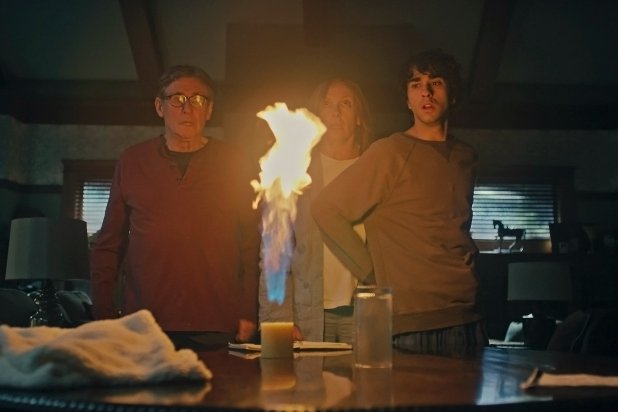At the Edinburgh Filmhouse from Fri 21 Jul 2018
After the success of last year’s It Comes at Night (2017) and 2015’s The VVitch (2015), A24 have once again produced another unsettling independent horror with Hereditary – a Greek tragedy of sorts about a woman and her family, whose lives slowly unravel as they begin to experience strange and possibly supernatural occurrences, after the loss of a family member.
Written and directed by newcomer Ari Aster – known for his short film The Strange Thing About the Johnsons (2011), Hereditary follows Annie Graham (Toni Collette) a dollhouse artist struggling to meet an art show deadline, while she and her husband Steve (Gabriel Byrne), older son Peter (Alex Wolff) and peculiar thirteen year-old daughter Charlie (Milly Shapiro) are still dealing with their grief in the aftermath of Annie’s difficult and semi-estranged mother’s death. What follows is an effectively old fashioned and atmospheric horror, expertly avoiding predictable scare tactics in favour of building an overwhelming sense of dread and tension, leading to a visceral and gloriously bizarre finale.
Almost twenty years on from her standout role in The Sixth Sense (1999), Collette delivers a career best with a towering and unhinged performance as a mother overcome with mourning and madness. Byrne gives a suitably subtle performance as the weary Steve, while Wolff and newcomer Shapiro brilliantly capture the grief and confusion that plagues the siblings.
Aster masterfully conveys an unrelenting dread filled mood, with long drawn out Kubrickian shots – the opening scene a perfect example, as the camera slowly zooms in on one of Annie’s dollhouses while accompanied by Saxophonist Colin Stetson’s droning and ominous score. The film also features an effective but not so subtle recurring motif that the family has no control over the invisible forces that appear to be tormenting them – which production designer Grace Yun uses to great effect by having the characters and household set out exactly like Annie’s dollhouse.
While Aster exhibits a keen sense of storytelling with plenty of unpredictable moments he does still at times follow all too familiar classic horror tropes. As with last year’s Get Out (2017) the film borrows heavily from the works of Ira Levin – with a strong whiff of Rosemary’s Baby (1968). The film is also slightly let down by some laughably heavy handed exposition – which as with many horror films may leave the viewer less unnerved by the revelations at the end of the film.
For the most part though Aster has succeeded with an accomplished debut full of nightmarish imagery and emotional terror, anchored by a colossal performance from Collette.
